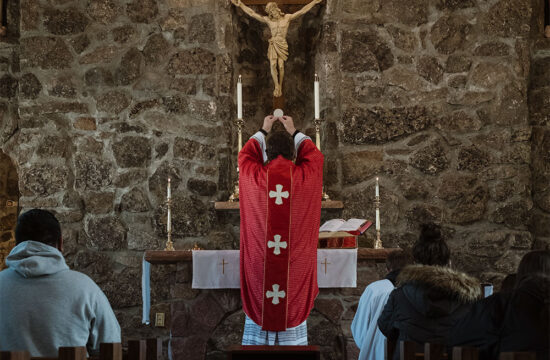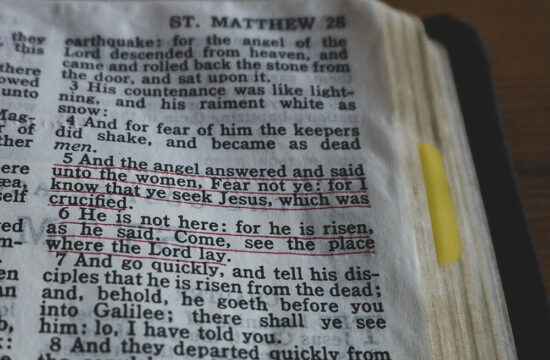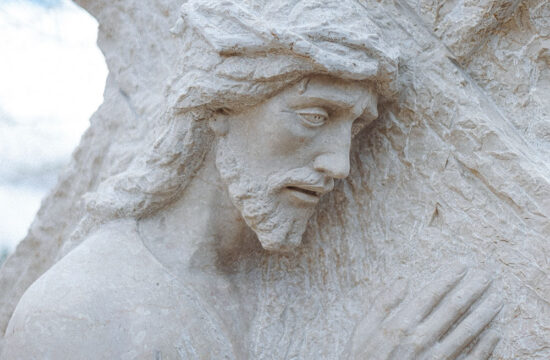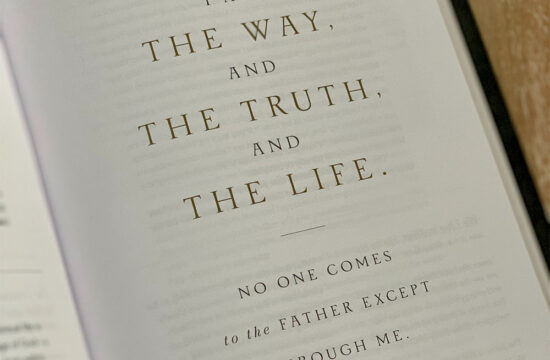DAY 313: LUKE 1 -2 ; Proverbs 26: 24-26
MESSIANIC FULFILLMENT
For each of our respites from Old Testament studies throughout the last 313 days, we’ve had what was called Messianic Checkpoints. For the bulk of the remainder of the year we will be hearing from St. Luke, who writes not only the Gospel that bears his name but the Acts of the Apostles – which is a second volume that lays out the beginnings of the Early Church after the Ascension of Jesus and the descent of the Holy Spirit at Pentecost.
What makes St. Luke stand out among the other Gospel writers is that he is a gentile (non-Jew) He is a Greek man who also happened to be a physician, meaning he was one of the most educated of followers which you will hear and experience in hearing and reading this Gospel. The beauty of this is how we again hear a distinctive voice, personality coming through again. Another witness and testimony who offers his unique perspective.
Why I’m excited that this should be the last Gospel we journey through is we can relate to Luke in a particular way. Being non-Jews as well, we have that in common with Luke – like most of us, Luke’s understanding of the Jewish roots came after his conversion to Jesus Christ. Which is what makes these opening chapters so exciting. Trying to imagine the editorial decisions that guided each of the authors, for Luke he takes nothing for granted. He adds these rich narratives, some of which are familiar, like the Annunciation and Nativity; some that might be less so, like the background to John the Baptist.
For Catholic priests and religious, the two canticles we read today are a part of our daily prayer. We pray Mary’s Song (the Magnificat) Luke 1: 45-55 every single day as part of our Evening Prayer. And we pray Zechariah’s praises (the Benedictus) every single day as part of our Morning Prayer. One of the joys for me with this Bible in a Year is that intentionally studying, reflecting and sharing all this time in the Old Testament with all of you helped bring these words to life in a way I hadn’t experienced previously. Every time praying, “Blessed be the Lord God of Israel, he has come to His people and set them free. He has raised up for us a mighty savior, born of the house of his servant David. Through His holy prophets He promised of old, that he would save us from our enemies, from the hands of all who hate us…” I had all these stories and memories running through my head and heart. Egyptians, Babylonians, Assyrians… Jeremiah, Micah… King David – the set backs, the threats, the hopes and dreams of God’s people – how Zechariah after being silenced until the birth of his son John the Baptist has been able to let the dawning of this new day to fully grasp his mind and heart. His first words are rejoicing in the fulfillment of his ancestors deepest longings – as he sees his son as the precursor to Jesus. I invite you to rewind or open your bibles and pray those again as we don’t “leave” the Old Testament, but rejoice in the dawning of it’s fulfillment. Welcome to St. Luke
DAY 314: LUKE 3-5 ; Proverbs 25: 27-28
SILENCE IS BROKEN
There’s so much ground to cover when it comes to the Gospels, know that I’m just going with what jumps out first and foremost in my heart. But that doesn’t mean there’s not a ton of other things to dig into in these three chapters!
Yesterday as we began our journey into the Gospel of Luke, we heard about Zechariah’s being silenced for asking the angel how this was going to happen – that he and his wife Elizabeth at this old age would have a child. As Fr. Mike had pointed out it was the manner in which he expressed himself. The fact that he was a priest, had an angelic visitor announcing these glad tidings, not to mention Zechariah would have been well versed in the story of Abraham and Sarah – had revealed a lack of faith, a doubt in the hearts of one of the priests of the Lord.
I’ve always thought about the fact that Zechariah in a sense represents the Jewish people, who had by their lack of faith had fallen into exile, seen the temple destroyed, and then ultimately the silence of God, without a prophetic utterance for 400 years. Zechariah’s voice is restored in the song of praise we discussed yesterday. And now today, the final prophet of the Lord; the bridge between the Old and the New Testament; John the Baptist speaks.
What does he say? He doesn’t speak something new. Beautifully his first words come from one of the prophets. And of all the prophetic words we have encountered and reflected on, the words that he felt compelled to proclaim come from the prophet Isaiah.
The silence of God is broken with a renewed prophetic word.
When Isaiah first uttered those words – the kingdom had first been divided and then the Jews had been exiled. They heard these words and imagined a day when they would return home. That there king would come and would send workers ahead to clear the way for that triumphant journey.
Hearing John proclaim these words the people would have known that prophecy had been fulfilled and lost already. Now in this bizarre world where the Jews had enslaved themselves to the Roman empire and what was a shell of the homeland they once had was still standing, what was John getting at? Or rather, what was God saying to His people? He’s telling them to make ready the way, not physically but to prepare their hearts and souls for the Messiah. And so all these poetic verses take on a deeper spiritual meaning: the valleys being filled in representing all that depresses and causes people despair; the mountains being made low is the pride and arrogant hearts that need to be humbled; the crooked paths that need to be straightened is a call to live lives of integrity; the rough ways being made smoothed are all that is jaded and cynical within, that we allow to be refined. After 400 years of waiting, God’s voice breaks forth raising anticipation of what’s to come. Inviting His people to get themselves ready for something greater than they ever imagined the Messiah would be. May we take an opportunity to quiet the noise of our world, entering into silence so God’s word can be heard and appreciated anew.
DAY 315: Luke 6-8; Proverbs 16: 1-3
WHAT DID YOU HEAR?
In chapter 6 of Luke’s Gospel we encounter a section that is familiar for sure. It’s almost like scriptural name-that-tune, or a round of Jeopardy – just hearing the words: “Blessed are you” we’re ready to announce “THE BEATITUDES” or rather “What are the Beatitudes?” But Luke’s version differs from the Gospel of Matthew’s in a particular way that’s noticeable. Luke’s version is much rawer than Matthew’s. We don’t hear “Blessed are the poor on spirit” or “hunger for righteousness” but “the poor” and “the hungry.” Those added words from Matthew seem to generalize it and make it more inclusive on a spiritual level while Luke’s version places those in material need more front an center. And Luke for good measure along with the “Blessed are you’s” come parallels of “Woe’s” which only seem to highlight the difference – “woe to you who are rich, for you have received your consolation; woe to you that are full now, for you shall hunger….”
Some would engage in academic observations about the biases of the authors, scholarly reflections on how the Gospels were composed, theological discussions about the different audiences these were initially directed at. While there is value to those things, we have to resist the temptation to do those things to explain away the differences and arrive at an interpretation that we feel more comfortable accepting.
More than likely, Jesus preached the Beatitudes more than once. And like any sermon, the listeners heard the words initially and the Holy Spirit often moves in the hearts of the individuals to hear something else as well. As someone who publishes their weekly homilies both in written and audio form, I often smile when people might give me feedback and tell me what it was they heard that was so impactful and recognize I never said what it was they heard, but can see how the Lord used something I said to speak directly to this person in an impactful and intentional way.
Which is one of the blessings of this journey we are on. As we read and hear God’s word, and know it to be alive and active, these texts that are thousands of years old still move hearts and souls. They still call us out to re-evaluate our relationship with the Lord… how that affects how we live… what we are (or are not) doing to bring God’s Kingdom to fruition in our day and time. Matthew and Luke present slightly different beatitudes but that doesn’t make one more accurate than the other. Rather, they highlight the importance is to have open ears and attentive hearts that will be docile to the Holy Spirit’s movement to be attentive to all that God is saying to us.
DAY 316: Luke 9-10; Proverbs 16: 4-6
TELL THE DEVIL TO GO TO HELL
As many of you have observed, these days reading through the Gospels seem overwhelming with stuff to unpack. Particularly in comparison to some of the Old Testament where some of the readings seemed to drag considerably. It’s a good reminder of a few things. One that God works through it all – He is in the ordinary and routine just as He is in the spectacular and miraculous. The other is a reminder that while the entire Bible is God’s story, in the Old Testament a variety of flawed, human characters were often times front and central to the narrative. Now in the New Testament, God Himself, God incarnate is not just the author (Jesus being the Word of the Father made flesh) – but also the central character. So there’s much more to take in. And forutnately, in a few weeks when we arrive in Advent, the Church will start a new lectionary cycle till next November where the primary Gospel for Sunday Mass will be the Gospel of Luke.
One of the incidents that stood out to me in today’s readings from Chapter 9 and 10 was Jesus healing this boy who is possessed by a demon. The father of the child makes the point that he had asked Jesus’ disciples (who had been given the ability to exorcize demons by the Lord) to help and they were unable to do anything. Jesus sounds a little disappointed hearing that report as he says “O faithless and perverse generation, how long am I to be with you and bear with you?” (Luke 9: 41).
What causes that critique? The disciples had failed not because they didn’t get the formula correct – like they had to follow a certain recipe or something in order to accomplish this deliverance. They had failed because of a lack of faith. Maybe it was seeing a child being possessed that had unnerved them or tripped them into thoughts of wonder (how did this happen? Why did this happen? What did someone do that caused this child to be vulnerable?) In all of that they had let themselves fall for the trap, the lies, the manipulations of the devil. They became in a sense obsessed with a fearful fascination in this evil rather than remembering they had one far more powerful who had empowered them to bring healing and restoration in His name.
It’s a good reminder for us that when we encounter evil -whether it’s something we see on our screens, hear in a variety of voices, experience in a litany of ways in our personal lives whether it’s an illness, a setback, a trial that completely unnerves us – it’s normal for us to be taken aback and upset by these things. But we can’t allow ourselves to be manipulated into obsessively over thinking about them and see them as the thing that will do us in. We’ve been saved and we’ve been commissioned by the one who died and rose from us to be bold, courageous and rely on Him in every trial. He has empowered us that when we sense the devil is afoot, that this is the only time it’s right and just to tell someone to “go to Hell. ”
DAY 317: Luke 11-12; Proverbs 16: 7-9
ASK SEEK KNOCK
So often when we hear some of these Gospel passages at Mass, we don’t fully appreciate the full context of what precedes or follows what we hear proclaimed. For example, in Chapter 11 we often hear this section where Jesus says “Ask and it will be given you; seek, and you will find; knock and it will be opened” as a stand alone passage regarding prayer. They sound good and are nice when we see a meme about it or a plaque somewhere with those reminders. For many they sound appropriate and in our sane mature moments we nod along in agreement. But when it comes to our practice, it’s not so much as ASK it’s DEMAND – it’s not SEEK it’s I DESERVE THIS sense of ENTITLEMENT – it’s not KNOCK it’s A TANTRUM THAT WE’RE NOT GETTING WHAT WE WANT. It reminds me of a comic strip that featured this teenager waking up in the morning with a silent prayer: “Please don’t let there be a test today.” In each successive panel in the strip, as she gets dressed, eats breakfast and heads off to school, she has the same prayer. The final panel shows her in class, taking a test. Now she’s thinking: “Does God ever listen to teen-agers?”
So what’s the point of our persistence in prayer if we don’t get what we want, if we don’t get that “loaf of bread” that we want from our neighbor? That’s where our reading the entire chapter is so helpful. These words come after Jesus’ disciples had just asked Him, “teach us to pray” and he responded with the prayer, the “Our Father.” If you think about the focus and the intentions that the “Our Father” lays out, the entire focus is not on our being prevented a test, not fixated on our temporal wants, needs or demands in a specific sense – but is completely centered on the reign of God becoming real, inaugurated, manifested in our time, in our day, in our lives.
That’s not meant to discount our own personal needs and intentions. But when we’re coming from the DEMAND/ I DESERVE THIS IF I DON’T GET IT I”M GOING TO HAVE A TANTRUM approach, then we’re not living as disciples and we’re treating God as a genie in the sky that we are trying to cajole to our way of thinking. Jesus suffered and died for us, rose from the dead where we want to follow and live in a relationship of love and trust in His reign, where we desire to be members of His Kingdom and that every aspect of our lives will be transformed by that. How is that demonstrated by our prayers – and how we live our lives?
DAY 318: Luke 13-16 Proverbs 25: 10-12
UNDERSTANDING SABBATH
Of all the things that Jesus does, one thing that comes up a lot that seems to really roil people is healing on the Sabbath. Having walked together through the Old Testament, we can appreciate the importance of it, but it’s interesting to see how the interpretation of Sabbath has been mis undestood. God’s Sabbath commandment was not merely the commandment to refrain from work — it was also the commandment to imitate God’s saving action by releasing others from bondage. So throughout the Jews history, it not only directed the Israelite heads of householdfor themselves not to engage in work themselves, but the same went for everyone else in their household—children, slaves, foreigners, and all livestock—from the bondage of work. One of the reasons for this prohibition was a weekly reminder of how God had broken the Israelites own yoke of slavery and had brought them forth out of Egypt. So they were all attempting to imitate God’s saving work.
With that in mind, you can appreciate Jesus’ vigorous work on the Sabbath day throughout Luke’s Gospel. He challenges the Pharisees by healing on the Sabbath several times. But Jesus is not violating the Sabbath command; he is perfecting it. For on the Sabbath we are commanded not to adopt some vile, self-serving inactivity as the Pharisees think. We are commanded to set aside our self-focused activity and instead cooperate, in some small measure, in the divine activity—that activity which shatters the bondage of the devil, of death, of sickness, of slaveries of all kinds. As Jesus says when he heals the crippled woman on the Sabbath: “And ought not this woman, a daughter of Abraham whom Satan bound for eighteen years, be loosed from this bond on the Sabbath day?” (Lk 13:16).
With that in mind, we are meant to ask ourselves What do I do on Sunday? Do I conceive of it just as another weekend day of “free time?” Or do I and my family consecrate it to some activity of working with Jesus? Mindful of how in Luke’s Gospel, Jesus’ burns so ardently against everything, interiorly and exteriorly, that enslaves human beings: “I have come to throw fire upon the earth—and how I wish it were already ignited!” (Lk 12:49).
DAY 319: Luke 17-19; Proberbs 25: 13-16
UNGRATEFUL LEPERS?
Luke 17 contains a Gospel scene where often times we’re focued on the lack of gratitude demonstrated by the 9 lepers. You would think it’s basic manners – can imagine my mother giving directions to me as a Kindergarten – when someone cures you of leprosy, you say Thank You. But perhaps that’s not what’s going on here. Perhaps the nine who kept going toward Jerusalem were fixating on completing Jesus’ instructions, not out of pure obedience but because they believed they needed to do something in order to merit the miracle. They are in a sense trying to justify themselves by accomplishing something difficult.
It’s striking to think that sometimes we can act the same way, particularly when we receive the Sacraments. When we’re assigned a penance, for example, in confession, our forgiveness isn’t contingent on doing that – those acts aren’t “making things right” but are meant to be acts of thanksgiving to celebrate the gift that God has generously poured out.
It is true that we need to act to bring about God’s kingdom on earth. God values our work and lets it bear fruit even if our personal relationship with God is strained. The nine lepers who didn’t take the time to say thank you were still cured. I am still given grace and forgiveness when I leave the reconciliation chapel with a to-do list on my mind. But the point Jesus is emphasizing here is the better, more humble, and more loving lifestyle involves taking time in prayer to thank and praise God.
In our desire for control and multi-tasking world, we can reduce God’s act and our responses to something very transactional – missing the love and relationship that these movements are meant to accomplish. The next time we find ourselves falling into those erroneous thoughts that tell us we need to do something to earn God’s love or pay Him back, may we remember the observation from the German priest and theologian Meister Eckhert, who once said “If the only prayer you ever say in your entire life is thank you, it will be enough.”
DAY 320: Luke 20-22:38; Proberbs 26: 17-19
CONTAINING JESUS
Reading Luke 20, you can almost hear the drum beats of the Passion getting louder and louder. Yesterday ended with Jesus “cleaning” the temple – which surely fired a lot of people up. Today we hear a variety of questions, debates, controversies – “Where did you get your authority?” “Is it lawful to give tribute to Caesar, or not?” This hypothetical question about an unfortunate widow who marries and is widowed 7 times by a family of obviously unhealthy brothers – and how that would work out with the resurrection of man.
You get the sense these aren’t coming from a place of openness – a desire to truly learn from Jesus and have Him redirect their hearts and souls. They’re looking for reasons to discredit Him, embarrass Him, find a way to diminish Him. We’re aware of the historical context of the events of 2,000 years ago leading into the paschal mystery. But reading these passages, it really stands out how often we can do the same.
We come upon a difficult teaching that the Church articulates that goes against popular opinion and dismiss it as “needing to change.” We know something we’re doing that is sinful and have a list of excuses why “God understands.” I encounter these types of things with college students on a regular basis and recognize how even I can fall into these types of attitudes myself.
Following Christ is difficult. The voices peppering Jesus with these questions are trying to contain Him. And it’s good to remember that the powers of this world have not changed. They are not going to yield to Him – but will try in any way to undermine Him, and if that doesn’t work, to eliminate Him. (They already crucified Him once…) And we can’t help but be affected by that ourselves as we constantly feel that tug of war where our faith and daily lives are pulling us in different directions.
This isn’t a suggestion for us to check our brains at the door and blindly obey what the Church teaches – or become scrupulous and obsessively worrying about what sins I’ve committed. Jesus wants to engage us – mind, heart and soul. It’s okay to have questions – it’s good for us to be honest about what we struggle with or even disagree with – it’s important to recognize the conflicts that arise from following Him and all the other parts of my life (family, work, school, government…) But we have to do that from the proper vantage point – with humility: recognizing who is God and who isn’t. Knowing that when we do, He wants to speak into our lives and lovingly guide us to fullness of life now and for all eternity.
DAY 321: Luke 22:39-24; Proberbs 26: 20-23
REMEMBER
For Mark it was all about the empty tomb. It was almost as if nothing else needed to be said.
For John, there was so many things that needed to be said, but he couldn’t put them all down (the world itself could not contain the books that would be written John 21: 25) but he highlighted things that were meant to help the reader see Jesus as the Son of God.
For Matthew, it was going back to Galilee… the apostles, the disciples, had to revisit all that they had experienced as a before and after experience. There lives before they met Jesus and then after they had met Him – seeing that was a dividing life where life had forever changed for them individually. In Jesus’ resurrection, this was a dividing life for all humanity – life had forever changed and there was an urgency for the apostles to proclaim that so all humanity could experience that as well.
For Luke – the word that stands out is Remember. The amazing news of the resurrection is coupled with these commands and experiences to remember. “Remember how he told you…” (24: 6) “they remembered His words…” (24: 8) The entire walk to Emmaus, the Risen Christ is walking and talking with these two disciples and they don’t even recognize Him, not until they’ve had an afternoon of Jesus calling them to remember how everything from the entirety of scripture pointed to these things happening and being fulfilled in Jesus.
My fellow Bible pilgrim – that is the true gift of this journey through the scriptures we’ve been on for 321 days now. Those confusing days, those difficult days, those boring days of reading were all pointing to this pivotal moment of Jesus being raised from the dead. For creation being re-created. For death to be defeated and eternal life being made real and possible to humanity who had lived in fear since the day we left Eden. Which is why for those who’ve been anxious that this “year” is coming to an end in 44 days we realize it cannot end. Our life with scripture is never a one and done thing. The Word of God isn’t something that even if we were able to memorize cover to cover we’d have full understanding or recollection of. Our own lives, our own journey’s, our setbacks and trials, our joys and triumphs – they seem to find new ways to challenge our faith… to distract us with something new… to confuse us about who we are and where we are going. The Word of God invites us to: Remember.











